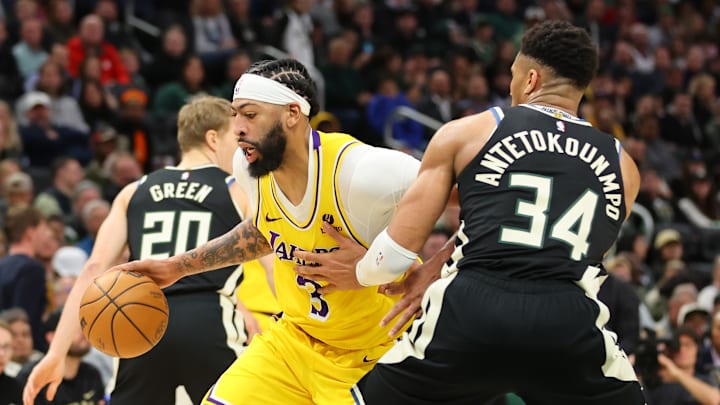The Los Angeles Lakers are preparing for a 2024-25 season that they hope will produce superior results compared to what transpired in 2023-24. Despite winning the inaugural NBA Cup, Los Angeles finished at 47-35 and uncermoniously bowed out in the first round of the playoffs.
With a new head coach and a seemingly rejuvenated Anthony Davis and LeBron James following their stellar performances at the Olympics, the Lakers are entering 2024-25 with an entirely new energy.
Los Angeles is running back a similar roster from a season ago, but the changes to the rotation are as drastic as they are subtle. A year ago, Jarred Vanderbilt inked a four-year, $48 million contract and Gabe Vincent joined the team on a three-year, $33 million deal.
The intention with both of those signings was to give Los Angeles two defensive-minded players who could work with Anthony Davis to anchor the team's efforts on that end of the floor.
Unfortunately, Vanderbilt and Vincent appeared in a combined 40 games due to injuries in 2023-24. The hopes is that they'll be able to stay healthy in 2024-25 and pair with incoming rookie Dalton Knecht to give the Lakers an entirely new look.
With Anthony Davis, Rui Hachimura, James, Austin Reaves, and D'Angelo Russell leading the charge, the Lakers could realistically be a better team in 2024-25—if this 10-game stretch goes their way.
Lakers face 10-game stretch that will define trajectory of 2024-25 season
Los Angeles won 47 games in 2024-25, suggesting a 50-win season is only a matter of marginal improvement. The rest of the NBA has improved, however, meaning the Lakers must be discernably better to take a real step forward.
Two of the most obvious areas in which the Lakers must thrive are winning the games they're supposed to and playing well against the highest level of competition.
Over the span of 10 similar games in 2024-25, the Lakers will face a series of tests in terms of how legitimate their championship aspirations are. If they're able to come out with a winning record, then the rest of the season will be a far more manageable mountain to climb.
If the Lakers struggle through this 10-game stretch, however, 50 wins and a potential top-four seed could be out of the question.
Date | Opponent | Home or Road? |
|---|---|---|
Saturday, February 22 | Denver Nuggets | Road Game |
Tuesday, February 25 | Dallas Mavericks | Home Game |
Thursday, February 27 | Minnesota Timberwolves | Home Game |
Friday, February 28 | LA Clippers | Home Game |
Sunday, March 2 | LA Clippers | Home Game |
Tuesday, March 4 | New Orleans Pelicans | Home Game |
Thursday, March 6 | New York Knicks | Home Game |
Saturday, March 8 | Boston Celtics | Road Game |
Monday, March 10 | Brooklyn Nets | Road Game |
Thursday, March 13 | Milwaukee Bucks | Road Game |
With the exception of the Brooklyn Nets, every one of those games will be played against a paper contender—and the next four games won't be any easier.
Date | Opponent | Home or Road? |
|---|---|---|
Friday, March 14 | Denver Nuggets | Road |
Sunday, March 16 | Phoenix Suns | Home |
Tuesday, March 18 | Milwaukee Bucks | Home |
Wednesday, March 19 | Denver Nuggets | Home |
A season ago, the Lakers were the epitome of hot and cold. They were below .500 after 49 games, sitting at a disappointing 24-25, but got hot at the right time to go 23-10 over the next 33 outings—an encouraging, yet simultaneously discouraging fact.
That 23-10 record equates to a win percentage of .697, or a 57-25 record across 82 games—so where exactly was that for the first 49?
If the Lakers can put some distance between themselves and a .500 record, finishing strong could actually count for something more than a Play-In Tournament appearance. That's the primary reason this 10-game stretch will prove so monumental.
If the Lakers play well under these tense circumstances, then one can expect a far better postseason seed come April than they've had in recent seasons.
